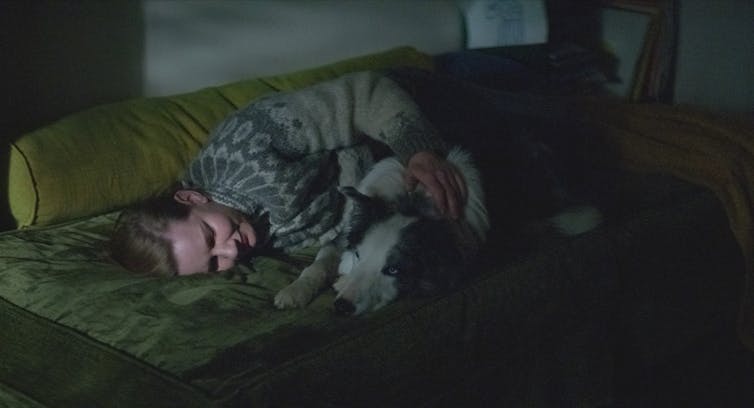In Justine Triet’s French legal drama Anatomy of a Fall, novelist Sandra Voyter (Sandra Hüller) is on trial for murdering her husband, Samuel (Samuel Theis), after he falls to his death from the attic of their Grenoble home.
During an early interview with her lawyer Vincent (Swann Arlaud), Sandra holds up her hand abruptly and utters “stop”. She’s a successful writer, used to being in control of the story – and she’s stopping this one before it goes any further.
Sandra’s hand hovers in front of Vincent, and it shakes with emotion. “I did not kill him,” she asserts. “That’s not the point,” her lawyer replies.
Vincent’s suggestion that the truth of Samuel’s death is unimportant is a tragic forecast. As Anatomy of a Fall unfolds and Sandra is scrutinised in court, Triet channels a forensic evisceration of the patriarchy against the backdrop of the French legal system to explore anti-feminist backlash and the rising tensions around gender parity in the modern family.
Finding the story underneath
Sandra is a strikingly unique character. As her trial progresses, Sandra’s grief is overlooked as Vincent and the court probe her personal life. Often, when she is pressed on her relationship, Sandra loudly clears the phlegm from her throat to mask rising emotion.
Rushed into her defence and not able to grieve, Sandra struggles with her emotions, concealing them whenever possible. When comforting her bedridden son Daniel (Milo Machado-Graner), she appeals to his sense of reason instead of emotion – despite speaking with a wavering voice. When nothing elicits a reaction, she shrugs and allows his godmother Monica (Sophie Fillières) to take her place.
Sandra is unabashed about prioritising her ambition alongside domestic labour and family responsibilities. She also places her own emotional wellbeing first. During the year her son is recovering from an accident which leaves him partially blind, she is revealed to have had several affairs with women in order to stay afloat emotionally. Speaking about these infidelities in court, Sandra is matter-of-fact, unremorseful about hurting her husband to protect herself.
Hüller plays Sandra with a naturalism aided by minimal makeup and simple costuming. Triet developed the script for the actress, and calls Hüller “honest” and her portrayal of Sandra “ungraspable”. This slipperiness – in portrayal and characterisation – shows Sandra as a dynamic, flawed creature. Triet showcases this nuanced portrayal via strategically shallow lensing and the occasional close up when framing Hüller, foregrounding the drama of her micro-expressions.
In one scene, blood rushes up Sandra’s neck and face during an argument with Samuel. He insists he performs the majority of their domestic labour and can’t focus on his writing. Her expression ripples, muscles in her neck contorting. She labels him a victim of his own making, before striking him on the face.
Read more:
What do women want? Freud’s infamous question invites voyeurism – but examining what they do is far more revealing
A woman’s place
Anatomy of a Fall begins with Samuel being found dead by Daniel. Police retrieve damning audio of an argument between the couple from Samuel’s computer, and Sandra is arrested for murder.
Placed on trial opposite a formidable state prosecutor, played by Antoine Reinartz, Sandra’s initial suggestion that Samuel died by suicide is dismissed. The prosecutor attempts to discredit Sandra as a selfish and unfeeling partner who cuckolded her husband and stole his ideas for her novel.
Madman Entertainment
The trial begins with a thorough examination of Sandra’s sexual orientation and maternal instinct in order to isolate her. The prosecutor signals doubt over Daniel’s testimony, attempting to separate Sandra from her only ally.
Despite its firm feminist history, sexism is on the rise in France. Triet explores this issue through the sustained attacks male characters direct at Sandra’s nontraditional lifestyle choices. The state prosecutor, defending his right to speak for Samuel’s absent voice, reiterates Samuel’s accusations surrounding Sandra’s success that verge into gaslighting.
The case reaches its crescendo via the audio recording of the fight, in which a tearful Samuel demands Sandra take more domestic responsibility to give him time to write. Stoic, she refuses.
The prosecutor frames Sandra as a time-greedy novelist with disdain for her family obligations. But Triet suggests another perspective: Sandra is a woman who has been dragged from her beloved London by the man she loves and stuck in an isolated house in a country where she doesn’t speak the language. She helps to take care of her son, and enjoys her work because she’s good at it and it makes her happy. Why should she give it up?
The gendered lens of domestic labour
Triet flips the traditional roles in Anatomy of a Fall. Samuel is the homemaker while Sandra performs traditionally masculine roles as the more confident, career-focused family member.
Through the inversion of these roles, Triet explores the persistence of patriarchal attitudes to women in the labour market. The director critiques the traditional notion of a woman’s place as being in the home via Sandra’s disinterest in playing the self-sacrificial role of homemaker Samuel seems desperate for her to take.

Madman Entertainment
While one might initially see Sandra as an overworked mother in a co-parenting relationship with the usual financial and time management problems, she is slowly revealed as the less skillful parent: Samuel is more suited to homeschooling, comforting and supporting their son, no matter the extenuating circumstances. His distaste at this role reveals the incongruity of insisting Sandra take his place.
Especially in the post-COVID era, where so many now work from home, Triet’s reversal of the familiarly gendered lens of domestic labour forms a timely critique. When viewed from this perspective Sandra’s earlier “stop” hand signal feels less like a threat than a plea for clemency.
Read more:
How Anatomy of a Fall reversed French art cinema’s box office decline







